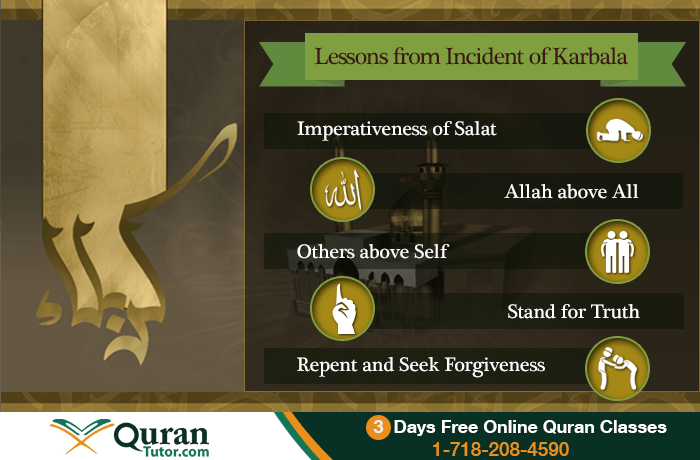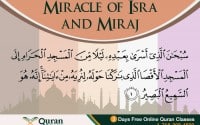Lessons We Can Learn from Incident of Karbala
The month of Muharram marks the start of the Islamic lunar calendar. The month is one of the best and most sacred months in the light of Quran and hadith in which Muslims try to fast for greater reward while the day of Ashora is known specifically for fasting. However, the day of Ashora has another significance which is historic in nature.

The tenth of Muharram of Ashora was the day on which Hazrat Hussain (RA) the Grandson of Prophet Muhammad (PBUH) was martyred in Karbala. Since then Muharram is observed in commemoration of the life which he and his companions gave for the sake of Islam and righteousness. Karbala incident is one of the most renowned incidents in the Islamic history and where it tells people of the sacrifice and struggle that the Grandson of Prophet (PBUH) faced, it also tells of the revival of Islam since then and the new life which their sacrifice gave to the religion.
There are a variety of lessons that a Muslim can learn from the incident of Karbala. Although the nature of lesson might vary from person to person, however, there are some general lesson which everyone could agree with. The lines below give the major lessons we can learn from the incident of Karbala.
Imperativeness of Salat:
During the Karbala incident when Hazrat Hussain (RA) was in the middle of battle and there were arrows flying around, he stopped in all this to offer the obligatory prayer. This gives a clear message to a Muslim that offering Salat is imperative and it should be considered under any circumstance. Moreover, the other thing that this act of his makes clear is the fact that when it comes to prayer there is no excuse. If he with the threat of his life in the battle ground could stop for prayers then what we do in our ordinary life is not that serious that we cannot put it on pause and offer prayer. Therefore, from the act of Hussain (RA) a Muslim must understand that he and his followers kept the spirit and obligations of Islam alive by offering Salat whilst being in the battlefield.
Allah Above All:
The incident of Karbala is an excellent example for all those who claim to love Allah Almighty. The incident shows that how those who love Allah have to sacrifice all they have just for His sake. Hazrat Hussain (RA) gave his life, the life of his friends, his family and even the life of his six months old son in the Karbala incident during the battle. It shows that those who love Allah truly, don’t just love Him in words, rather they love Him for all they have and when the time comes they are willing to sacrifice all they have, their life and the life of their loved ones for the sake of Allah. From this a Muslim can learn the message that if Hussain (RA) gave the life of his son and family for Allah’s sake, then why cant we sacrifice the worldly temptations of everyday life and refrain from them for the sake of Allah.
Others Above Self:
The incident of Karbala is is known for the sacrifice which Hussain and his companions made for the sake of Allah, however, the incident is also fill with the sacrifices which people made for each other in the field. The best example in this regard is of Hazrat Abbas (RA) who was the half brother of Hussain (RA), did not drink water from the stream whilst sitting beside it for three days, all for the reason that his brother was thirsty and if he hasn’t drunk water so should he as well. This shows how Abbas (RA) thought of his brother even in the most adverse circumstances. A Muslim can learn the lesson of thinking of others or keeping others above one’s own self and if we cannot find the courage and strength of doing so, then we can at least love others and spread our love to them so that we could live in peace.
Standing For Truth:
All over the world the incident of Karbala is synonymous with standing for truth and righteousness. The incident and what happened in it all show that sticking to truth and standing for it is not an easy thing to do, but when one stands for truth and righteousness then one should be willing to go the distance. Hussain once ascertain of his truth, stood for the religion and with the passage of time during the siege the things started getting tougher till the moment the battle broke, but throughout all this the resolution of Hussain and his companions did not shake rather they stood for the truth they believed in. the same message is what Muslims of present can learn. Muslims must realize that truth and righteousness is what Islam stands for, it is against all sorts of oppression and aggression and a Muslim must make sure that wherever there is oppression and tyranny, he or she must stand for it and speak and stand for truth.
Repenting And Forgiving:
Another subtle message that the incident of Karbala gives is of repenting over faults and sins and forgiving people. Al Hur was an ally to those who schemed against Hussain (RA) and was at front in planning his entrapment. However, when the things got tough he realized his mistake and went to seek forgiveness from Hussain, and Hussain without holding any grudge forgave him. This shows that no matter whatever sin or mistake one has committed one should repent for it and it is never too late for repenting, especially when one is repenting in front of Allah. Similarly, if Hussain (RA) could forgive a person who planned for his death, then why cant we forgive people for their simple mistakes. Therefore, repentance and forgiveness is also something which a Muslim can learn from the incident of Karbala.
Conclusion:
In short, the incident of Karbala generally stands for the sacrifice that Hussain and his companions gave for the religion and sake of Allah. Their sacrifice, their patience, their resolution all stand as striking examples for Muslims and by learning from their example Muslims can make their life righteous and the world a better place.









